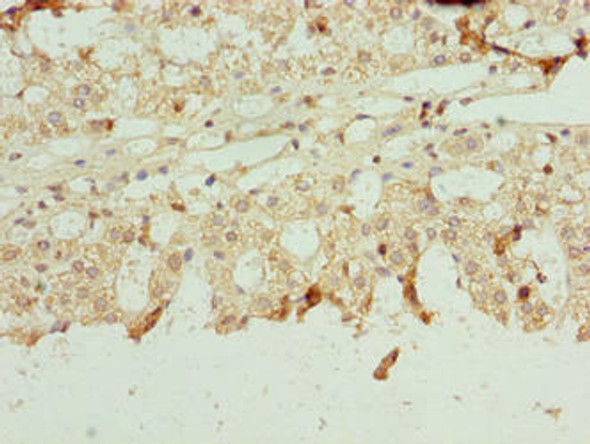NETO2 Antibody (PACO10822)
- SKU:
- PACO10822
- Product Type:
- Antibody
- Reactivity:
- Human
- Mouse
- Rat
- Host Species:
- Rabbit
- Isotype:
- IgG
- Applications:
- ELISA
- WB
- Antibody Type:
- Polyclonal Antibody
- Conjugation:
- Unconjugated
Frequently bought together:
Description
| Antibody Name: | NETO2 Antibody (PACO10822) |
| Antibody SKU: | PACO10822 |
| Size: | 50ul |
| Host Species: | Rabbit |
| Tested Applications: | ELISA, WB |
| Recommended Dilutions: | |
| Species Reactivity: | Human, Mouse, Rat |
| Immunogen: | Human NETO2 |
| Form: | Liquid |
| Storage Buffer: | PBS with 0.1% Sodium Azide, 50% Glycerol, pH 7.3. -20°C, Avoid freeze / thaw cycles. |
| Purification Method: | Antigen Affinity Purified |
| Clonality: | Polyclonal |
| Isotype: | IgG |
| Conjugate: | Non-conjugated |
| Synonyms: | neuropilin (NRP) and tolloid (TLL)-like 2;NETO2;FLJ10430;FLJ14724;FLJ90456;NEOT2 ; |
| UniProt Protein Function: | NETO2: Accessory subunit of neuronal kainate-sensitive glutamate receptors, GRIK2 and GRIK3. Increases kainate-receptor channel activity, slowing the decay kinetics of the receptors, without affecting their expression at the cell surface, and increasing the open probability of the receptor channels. Modulates the agonist sensitivity of kainate receptors. Slows the decay of kainate receptor-mediated excitatory postsynaptic currents (EPSCs), thus directly influencing synaptic transmission. 2 isoforms of the human protein are produced by alternative splicing.Protein type: Membrane protein, integralChromosomal Location of Human Ortholog: 16q11Cellular Component: kainate selective glutamate receptor complex; postsynaptic densityMolecular Function: ionotropic glutamate receptor binding |
| UniProt Protein Details: | |
| NCBI Summary: | This gene encodes a predicted transmembrane protein containing two extracellular CUB domains followed by a low-density lipoprotein class A (LDLa) domain. A similar gene in rats encodes a protein that modulates glutamate signaling in the brain by regulating kainate receptor function. Expression of this gene may be a biomarker for proliferating infantile hemangiomas. A pseudogene of this gene is located on the long arm of chromosome 8. Alternatively spliced transcript variants encoding multiple isoforms have been observed for this gene. [provided by RefSeq, Jan 2011] |
| UniProt Code: | Q8NC67 |
| NCBI GenInfo Identifier: | 24041026 |
| NCBI Gene ID: | 81831 |
| NCBI Accession: | NP_060562.3 |
| UniProt Secondary Accession: | Q8NC67 |
| UniProt Related Accession: | Q8NC67 |
| Molecular Weight: | |
| NCBI Full Name: | neuropilin and tolloid-like protein 2 isoform 1 |
| NCBI Synonym Full Names: | neuropilin and tolloid like 2 |
| NCBI Official Symbol: | NETO2 |
| NCBI Official Synonym Symbols: | BTCL2; NEOT2 |
| NCBI Protein Information: | neuropilin and tolloid-like protein 2 |
| UniProt Protein Name: | Neuropilin and tolloid-like protein 2 |
| UniProt Synonym Protein Names: | Brain-specific transmembrane protein containing 2 CUB and 1 LDL-receptor class A domains protein 2 |
| Protein Family: | Neuropilin and tolloid-like protein |
| UniProt Gene Name: | NETO2 |
| UniProt Entry Name: | NETO2_HUMAN |



